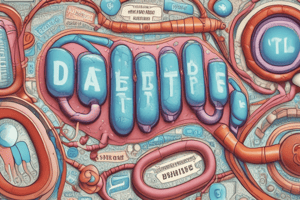Podcast
Questions and Answers
What is one of the primary functions of amylin in the body?
What is one of the primary functions of amylin in the body?
- It acts independently to reduce insulin levels.
- It stimulates the formation of glucagon.
- It slows gastric emptying and glucose absorption. (correct)
- It increases gastric emptying rate.
Which of the following best describes the relationship between insulin and amylin?
Which of the following best describes the relationship between insulin and amylin?
- Insulin inhibits the release of amylin.
- Insulin and amylin have no significant relationship.
- Amylin is a hormone that works solely without insulin.
- Amylin functions in conjunction with insulin to regulate blood sugar. (correct)
In which types of diabetes is amylin treatment considered an adjunct therapy?
In which types of diabetes is amylin treatment considered an adjunct therapy?
- Type 1, Type 2, and gestational diabetes.
- Type 1 and Type 3 diabetes.
- Type 2 and Type 4 diabetes.
- Type 1 and Type 2 diabetes. (correct)
What effect does amylin have on postprandial glucagon release?
What effect does amylin have on postprandial glucagon release?
How can amylin levels be increased in the body?
How can amylin levels be increased in the body?
Which of the following is NOT a clinical feature of diabetes mellitus?
Which of the following is NOT a clinical feature of diabetes mellitus?
What complication is categorized as an acute complication of diabetes mellitus?
What complication is categorized as an acute complication of diabetes mellitus?
Which treatment is primarily focused on lifestyle changes in managing diabetes?
Which treatment is primarily focused on lifestyle changes in managing diabetes?
Which of the following is an indication for insulin therapy in diabetes management?
Which of the following is an indication for insulin therapy in diabetes management?
Who co-discovered insulin and was awarded the Nobel Prize for this achievement?
Who co-discovered insulin and was awarded the Nobel Prize for this achievement?
Which of the following is most commonly associated with type I diabetes?
Which of the following is most commonly associated with type I diabetes?
Which type of cell in the pancreatic islets is responsible for secreting glucagon?
Which type of cell in the pancreatic islets is responsible for secreting glucagon?
What condition is considered a chronic complication of diabetes?
What condition is considered a chronic complication of diabetes?
What is the primary effect of insulin on glucose levels in the blood?
What is the primary effect of insulin on glucose levels in the blood?
Which of the following is NOT a method of diabetes treatment?
Which of the following is NOT a method of diabetes treatment?
What is a characteristic feature of Type 1 Diabetes Mellitus?
What is a characteristic feature of Type 1 Diabetes Mellitus?
What is the normal fasting blood glucose level range?
What is the normal fasting blood glucose level range?
In which condition is hyperglycemia defined as a blood glucose level greater than 180 mg/dl?
In which condition is hyperglycemia defined as a blood glucose level greater than 180 mg/dl?
Which factor is associated with an increased risk of developing Type 2 Diabetes Mellitus?
Which factor is associated with an increased risk of developing Type 2 Diabetes Mellitus?
Which of these statements accurately describes Type 2 Diabetes Mellitus?
Which of these statements accurately describes Type 2 Diabetes Mellitus?
What hormone is primarily secreted by delta cells of the pancreatic islets?
What hormone is primarily secreted by delta cells of the pancreatic islets?
What condition is characterized by low blood glucose levels?
What condition is characterized by low blood glucose levels?
What is a common trigger for Type 1 Diabetes Mellitus?
What is a common trigger for Type 1 Diabetes Mellitus?
Which insulin preparation is classified as ultra-long acting?
Which insulin preparation is classified as ultra-long acting?
What is the primary route of administration for insulin?
What is the primary route of administration for insulin?
Which type of insulin has the quickest onset time?
Which type of insulin has the quickest onset time?
What is a characteristic of conventional therapy for insulin administration?
What is a characteristic of conventional therapy for insulin administration?
Why is daily self-monitoring of glucose emphasized in intensive insulin therapy?
Why is daily self-monitoring of glucose emphasized in intensive insulin therapy?
What is the typical duration of action for intermediate-acting insulin?
What is the typical duration of action for intermediate-acting insulin?
Which of the following insulin types is most likely to have a decreasing risk of hypoglycemia?
Which of the following insulin types is most likely to have a decreasing risk of hypoglycemia?
In a daily insulin schedule, when should short-acting insulin be administered before meals?
In a daily insulin schedule, when should short-acting insulin be administered before meals?
What is the peak time for short-acting insulin after administration?
What is the peak time for short-acting insulin after administration?
What is a potential consequence of intensive insulin therapy compared to conventional therapy?
What is a potential consequence of intensive insulin therapy compared to conventional therapy?
Which type of insulin mimics the response of natural insulin release in the body?
Which type of insulin mimics the response of natural insulin release in the body?
When is it advisable to administer long-acting insulin in a daily schedule?
When is it advisable to administer long-acting insulin in a daily schedule?
What is a common characteristic of the absorption of subcutaneous insulin?
What is a common characteristic of the absorption of subcutaneous insulin?
What is the primary action of SGLT-2 inhibitors like gliflozins?
What is the primary action of SGLT-2 inhibitors like gliflozins?
Which of the following is a potential adverse effect associated with gliflozins?
Which of the following is a potential adverse effect associated with gliflozins?
What is the mechanism through which gliflozins result in glycosuria?
What is the mechanism through which gliflozins result in glycosuria?
Gliflozins are primarily used for which type of diabetes?
Gliflozins are primarily used for which type of diabetes?
What is a common risk associated with the use of gliflozins regarding urinary tract infections?
What is a common risk associated with the use of gliflozins regarding urinary tract infections?
What occurs as a result of excessive glucose loss in urine from gliflozins?
What occurs as a result of excessive glucose loss in urine from gliflozins?
Which of the following statements regarding gliflozins is correct?
Which of the following statements regarding gliflozins is correct?
Which of these antidiabetic agents acts as insulin secretagogues?
Which of these antidiabetic agents acts as insulin secretagogues?
What is the sodium-glucose cotransporter 2 (SGLT-2) responsible for?
What is the sodium-glucose cotransporter 2 (SGLT-2) responsible for?
What do gliflozins ultimately lead to in terms of glucose levels in the blood?
What do gliflozins ultimately lead to in terms of glucose levels in the blood?
Which factor enhances the absorption of insulin injected into a specific site?
Which factor enhances the absorption of insulin injected into a specific site?
Which of the following insulin delivery methods is considered the most advanced?
Which of the following insulin delivery methods is considered the most advanced?
What is a major risk associated with sulfonylureas?
What is a major risk associated with sulfonylureas?
In which patient population are Biguanides particularly advantageous?
In which patient population are Biguanides particularly advantageous?
Which mechanism of action is associated with Meglitinides?
Which mechanism of action is associated with Meglitinides?
What is a common side effect of Metformin?
What is a common side effect of Metformin?
Which statement is true regarding Type 1 diabetes medications?
Which statement is true regarding Type 1 diabetes medications?
What is the mechanism of action for Thiazolidinediones (TZDs)?
What is the mechanism of action for Thiazolidinediones (TZDs)?
Which drug class is contraindicated during pregnancy due to teratogenic effects?
Which drug class is contraindicated during pregnancy due to teratogenic effects?
What distinguishes first-generation from second-generation sulfonylureas?
What distinguishes first-generation from second-generation sulfonylureas?
Which of the following regarding insulin resistance is accurate?
Which of the following regarding insulin resistance is accurate?
What is the main role of insulin pumps?
What is the main role of insulin pumps?
Which of the following insulin types is associated with a shorter duration of action?
Which of the following insulin types is associated with a shorter duration of action?
What is a potential adverse effect of Thiazolidinediones?
What is a potential adverse effect of Thiazolidinediones?
How does exercise affect insulin absorption?
How does exercise affect insulin absorption?
Flashcards
Pancreatic Islets
Pancreatic Islets
Clusters of cells in the pancreas that secrete hormones.
Glucagon
Glucagon
A hormone that increases blood glucose levels.
Insulin
Insulin
A hormone that lowers blood glucose levels.
Type 1 Diabetes
Type 1 Diabetes
Signup and view all the flashcards
Type 2 Diabetes
Type 2 Diabetes
Signup and view all the flashcards
Blood Glucose Levels (Normal)
Blood Glucose Levels (Normal)
Signup and view all the flashcards
Hypoglycemia
Hypoglycemia
Signup and view all the flashcards
Hyperglycemia
Hyperglycemia
Signup and view all the flashcards
Gluconeogenesis
Gluconeogenesis
Signup and view all the flashcards
Glycogenolysis
Glycogenolysis
Signup and view all the flashcards
Diabetes Complications (Acute)
Diabetes Complications (Acute)
Signup and view all the flashcards
Diabetes Complications (Chronic)
Diabetes Complications (Chronic)
Signup and view all the flashcards
Insulin Therapy Indications
Insulin Therapy Indications
Signup and view all the flashcards
Diabetes Treatment (Diet)
Diabetes Treatment (Diet)
Signup and view all the flashcards
Diabetes Treatment (Medications)
Diabetes Treatment (Medications)
Signup and view all the flashcards
Clinical Features of Diabetes Mellitus
Clinical Features of Diabetes Mellitus
Signup and view all the flashcards
Gestational Diabetes
Gestational Diabetes
Signup and view all the flashcards
Oral Hypoglycemics
Oral Hypoglycemics
Signup and view all the flashcards
Insulin Source (Bovine)
Insulin Source (Bovine)
Signup and view all the flashcards
Insulin Source (Porcine)
Insulin Source (Porcine)
Signup and view all the flashcards
Insulin Source (Human Recombinant)
Insulin Source (Human Recombinant)
Signup and view all the flashcards
Insulin Standardization
Insulin Standardization
Signup and view all the flashcards
Insulin Administration Route
Insulin Administration Route
Signup and view all the flashcards
Fast-Acting Insulin
Fast-Acting Insulin
Signup and view all the flashcards
Short-Acting Insulin
Short-Acting Insulin
Signup and view all the flashcards
Intermediate-Acting Insulin
Intermediate-Acting Insulin
Signup and view all the flashcards
Long-Acting Insulin
Long-Acting Insulin
Signup and view all the flashcards
Conventional Insulin Therapy
Conventional Insulin Therapy
Signup and view all the flashcards
Intensive Insulin Therapy
Intensive Insulin Therapy
Signup and view all the flashcards
Insulin Absorption
Insulin Absorption
Signup and view all the flashcards
Amylin: What's it do?
Amylin: What's it do?
Signup and view all the flashcards
Amylin's Role: Insulin's Buddy
Amylin's Role: Insulin's Buddy
Signup and view all the flashcards
Amylin: Solo Act?
Amylin: Solo Act?
Signup and view all the flashcards
Amylin Action: Slowing Down
Amylin Action: Slowing Down
Signup and view all the flashcards
Amylin & Glucagon: Enemy?
Amylin & Glucagon: Enemy?
Signup and view all the flashcards
Factors affecting absorption
Factors affecting absorption
Signup and view all the flashcards
Best injection site for absorption
Best injection site for absorption
Signup and view all the flashcards
Injection site order of absorption
Injection site order of absorption
Signup and view all the flashcards
Insulin pumps
Insulin pumps
Signup and view all the flashcards
Insulin pens
Insulin pens
Signup and view all the flashcards
Transdermal insulin delivery
Transdermal insulin delivery
Signup and view all the flashcards
Inhaled insulin
Inhaled insulin
Signup and view all the flashcards
Oral insulin formulations
Oral insulin formulations
Signup and view all the flashcards
Insulin allergy
Insulin allergy
Signup and view all the flashcards
Insulin resistance
Insulin resistance
Signup and view all the flashcards
Lipoatrophy
Lipoatrophy
Signup and view all the flashcards
Hypertrophy
Hypertrophy
Signup and view all the flashcards
Sulfonylureas
Sulfonylureas
Signup and view all the flashcards
Biguanides
Biguanides
Signup and view all the flashcards
What is SGLT-2?
What is SGLT-2?
Signup and view all the flashcards
What do Gliflozins do?
What do Gliflozins do?
Signup and view all the flashcards
What is Glycosuria?
What is Glycosuria?
Signup and view all the flashcards
How do Gliflozins help with blood sugar?
How do Gliflozins help with blood sugar?
Signup and view all the flashcards
Gliflozins - When are they used?
Gliflozins - When are they used?
Signup and view all the flashcards
What are some adverse effects of Gliflozins?
What are some adverse effects of Gliflozins?
Signup and view all the flashcards
How does Gliflozin use affect glucose in urine?
How does Gliflozin use affect glucose in urine?
Signup and view all the flashcards
Gliflozins - Examples
Gliflozins - Examples
Signup and view all the flashcards
What is Ketoacidosis?
What is Ketoacidosis?
Signup and view all the flashcards
Gliflozins & amputations - How are they linked?
Gliflozins & amputations - How are they linked?
Signup and view all the flashcards
Study Notes
Pancreatic Glands
- Exocrine glands produce pancreatic digestive enzymes via pancreatic acini
- Endocrine glands form pancreatic islets (Islets of Langerhans) and secrete hormones
Cells of Pancreatic Islets
- Alpha cells secrete glucagon
- Beta cells secrete insulin
- Delta cells secrete somatostatin
- PP (F) cells secrete pancreatic polypeptide
Effects of Glucagon
- Stimulates glucose production in the liver (gluconeogenesis)
- Stimulates glycogen breakdown into glucose in skeletal muscles and liver cells (glycogenolysis)
- Stimulates triglyceride breakdown in adipose tissue and fatty acid release (lipolysis)
Effects of Insulin
- Accelerates glucose uptake and utilization by cells.
- Stimulates glycogen formation (glycogenesis)
- Stimulates triglyceride formation in adipose tissue (lipogenesis)
- Stimulates amino acid absorption and protein synthesis
Insulin vs. Glucagon Actions
- Insulin lowers blood glucose
- Glucagon raises blood glucose
Mechanism of Insulin Action
- Insulin binds specific insulin receptors on cell membranes
- This triggers signal transduction and gene expression/growth regulation
- Glucose utilization (glycogen, lipid, protein synthesis) increases
Main Target Organs of Insulin
- Liver
- Muscle
- Adipose tissue
Blood Glucose Levels
- Normal fasting blood glucose: 70-110 mg/dL
- Normal 2-hour postprandial blood glucose: <180 mg/dL
- Hypoglycemia: <70 mg/dL
- Hyperglycemia: >110 mg/dL (fasting)
- Impaired glucose tolerance: 110-180 mg/dL
- Diabetes mellitus: >180 mg/dL
Types of Diabetes Mellitus
- Primary DM:
- Type 1 (Insulin-Dependent DM - IDDM): insulin deficiency
- Type 2 (Non-Insulin Dependent DM - NIDDM): insulin resistance
- Secondary DM:
- Pancreatic disease (e.g., pancreatitis, tumor)
- Endocrine disease (e.g., Cushing's syndrome)
- Drug induced (e.g., thiazide diuretics)
- Infection (e.g., congenital rubella)
- Gestational DM: during pregnancy
Primary DM - Type 1 and Type 2
- Type 1:
- Abnormality: β-cell destruction, insulin deficiency
- Incidence: Less common
- Age of onset: <30 years
- Etiology: Autoimmune, often with precipitating factor
- Autoantibodies: commonly present (60-85%)
- Type 2:
- Abnormality: β-cell dysfunction, insulin resistance
- Incidence: More common
- Age of onset: >40 years
- Etiology: Multifactorial (genetic and environmental)
- Autoantibodies: rarely present (<10%)
Primary DM - Genetics, Body Weight, Diabetic Ketoacidosis, HHS
- Genetics: Lesser impact in type 1, greater impact in type 2
- Body weight: Low in type 1, overweight/obese in type 2
- Diabetic ketoacidosis: More common in type 1
- HHS: Less common in type 1, more common in type 2
- Treatment: Insulin for type 1, oral hypoglycemics + insulin for type 2
Obesity and Type 2 DM
- Obesity is linked to an increased risk of type 2 diabetes
- Increased body weight by 10kg increases risk of type 2 DM dramatically (3X)
- Obesity often leads to earlier onset of type 2 diabetes
Obesity, Inactivity, and Unhealthy Diet
- Obesity, inactivity, and unhealthy diet are risk factors for type 2 diabetes in both adults and children.
The Deadly Quartet
- Obesity, diabetes, hypertension, and dyslipidemia are linked and pose significant health risks.
Clinical Features of DM
- Polydipsia (excessive thirst)
- Polyuria (excessive urination)
- Nocturia (Frequent urination at night)
- Glycosuria (glucose in the urine)
- Complications (detailed in the further notes below)
Complications of DM
- Acute: DKA (Diabetic Ketoacidosis), HONK (Hyperosmolar Hyperglycemic Nonketotic Coma)
- Chronic:
- Angiopathy
- Microangiopathy (e.g., Retinopathy, Nephropathy)
- Macroangiopathy (e.g., CAD, PAD, CVA)
- Angiopathy
- Other: Infection and skin issues
Treatment of DM
- Diet control
- Antidiabetic agents
- Management of complications
Diet Control
- Minimize sugar intake or adjust medication/insulin accordingly to control blood sugar
- Reduce body weight
- Increase physical activity
Antidiabetic Agents
- Insulin (more common with type 1)
- Oral Hypoglycemics (Type 2)
Insulin
- History: Frederick Banting first human trial in 1923
- Sources: Bovine, Porcine, Human Recombinant
- Administration: Injection (SC, IV, IM). Alternative methods: Pump
- Preparations: Fast-acting, short-acting, intermediate-acting, long-acting, ultra-long-acting, mixed types (combinations)
- Regimens: Conventional therapy (1-2 injections/day) Intensive therapy (multiple daily injections, glucose monitoring, and dose adjustment.)
- Daily Insulin Schedule (example)
- Absorption of SC Insulin (highly variable, affected by factors such as site of injection, blood flow, exercise, massage)
- Alternatives to Insulin Injection (insulin pumps, insulin pens, transdermal, inhaled, and oral formulations)
- Common Insulin Delivery Devices (insulin syringe, insulin pen, jet injector, insulin pump, inhaled insulin)
- Complications of Insulin Therapy (systemic and local)
- Hypoglycemia, insulin allergy, insulin resistance, lipoatrophy, hypertrophy
Oral Hypoglycemics
- Sulfonylureas (first generation, second and third generation) ; Mechanism of Action; Pharmacokinetics; Drug interactions; Adverse Effects
- Biguanides (mechanism of action, indications, advantages, adverse effects [Metformin – commonly used]).
- Meglitinides (Mechanism of action, Indications, Adverse effects, [repaglinide & nateglinide])
- Thiazolidinediones (TZDs or glitazones) (Mechanism of action, indications, adverse effects, [Rosiglitazone & Pioglitazone])
- Alpha-glucosidase inhibitors (Mechanism of action, indications, side effects, [Example Acarbose])
- Recent Antidiabetic Agents (Glucagon-like peptide-1 (GLP-1), DPP-4, Amylin Analogues, Gliflozins).
- GLP-1 agonists (Mechanism & Example Exenatide)
- DPP-4 Inhibitors (Mechanism and examples [Sitagliptin and Saxagliptin])
- Amylin analogues (Mechanism & Example Pramlintide)
- Gliflozins (Mechanism, indications, adverse effects, example canagliflozin)
Studying That Suits You
Use AI to generate personalized quizzes and flashcards to suit your learning preferences.




